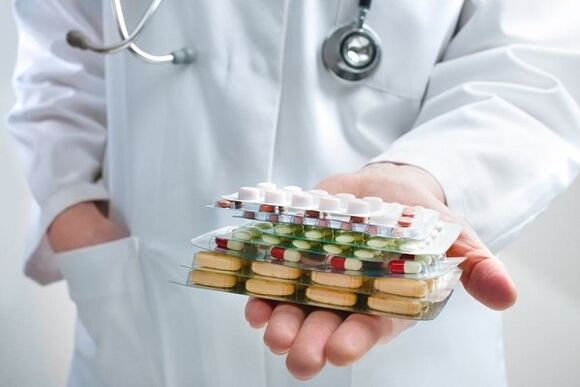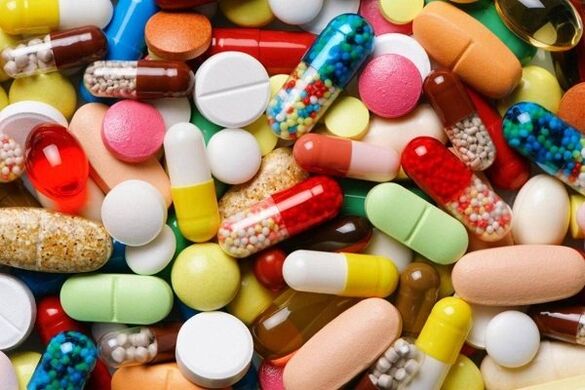Inflammation of the prostate gland is a common disease among men of all ages;The pathology is diagnosed especially in patients over 50 years old.The disease greatly impairs quality of life, causing urinary, fertility, and potential problems and causing pain.

Diseases should be treated immediately and thoroughly.For this, the patient is prescribed drugs, physiotherapy and a healthy lifestyle.Antibiotics are one of the main methods of treatment for bacterial prostatitis, but it is very important to choose the right drug and dose of treatment to be effective.
Indications for the use of antibacterial compounds
Before you think about what antibiotics are for tostatitis, you need to understand the reason for its occurrence.Contrary to the opinion of many patients, inflammation of the prostate gland occurs not only due to infection, but also due to degenerative disorders in the body.In the latter case, non-infectious prostatitis was detected.
To diagnose the disease, a tank culture or PRC analysis is performed, with the help of which the doctor will detect the pathogen.If the bacteria are not identified, there is no need to take antibiotics.In this case, symptomatic therapy, diet, physical therapy and proper sexual activity are indicated.

If leukocytes are found in the prostate secretion and the pathogen is identified, then bacterial or tuberculous prostatitis is diagnosed.Both types of disease require special treatment with antibiotics.
Often, one PRC analysis is enough, which gives results the next day.After identifying the bacteria, the doctor prescribes a suitable antibiotic for prostatitis.If treatment is ineffective, then a prostate fluid tank culture should be performed to determine antibacterial agent sensitivity.
Antibiotic groups
Only a doctor can answer exactly which antibiotics to buy for prostatitis.Because bacteria must be detected first.If you thin yourself, there is a high risk of not predicting the group and turning the disease into a chronic form, which will significantly complicate the treatment process.
You should also understand that the cause of the pathology may be a fungal infection, not bacteria.In this case, antibiotics will not help;You need to take a drug with an antifungal effect.

Treatment of acute and chronic forms of the disease is carried out using the following drug groups:
- Tetrakyllines.If bacteria are detected: ureaplasma, mycoplasma, mycoplasma, enterobacteria, chlamydia, klibsiella, enterococci, Serratia, E. coli.
- Fluoroquinolone.Designed for the following bacteria: ureaplasma, mycoplasma, gonococci, chlamydia, proteus, klebsiella, escherichia coli and koch's bacillus.
- Penicillin.If detected: gonococci, enterobactia, enteroccci, Klebsiella, Proteus, Serratia, Escherichia Coli.
- Cephalosporins.Determined for the following bacteria: Enterobacteria, Enterococci, Klebsiella, Proteus, E. Coli.
- Macrolides.It is indicated: Gonococci, Chlamydia, Ureaplasma, mycoplasma were detected.
- Aminoglycosides.Determined for the following bacteria: Klebsiella, Enterobactiaceeae, Pseudomonas.
- Hydroxyquinolines.Effective against the following bacteria: ureaplasma, mycoplasma, trichomonas, klibsiella, E. coli, etc.
Most often, drugs from the group of penicillins and cephalosporins are prescribed.Macroids are rarely used because they are not particularly effective for prostatitis.Tetracyclines have side effects, so they are rarely prescribed unless other drugs are taken.
Aminoglycosides are effective for acute prostatitis.They penetrate the prostate and accumulate there, allowing to get rid of the infection.Such an antibiotic for the treatment of chronic disease, in general, it was not possible to achieve the required concentration of the substance in the gland.
For chronic prostatitis of the bacterial type, doctors most often choose a group of fluoroquinolones.They are most effective for inflammation of the prostate gland.
However, it should be noted that fluoroquinolones have serious side effects and should not be taken until TB is diagnosed.Such drugs for prostate tuberculosis should be taken together with other antibiotics, otherwise the treatment will be ineffective and the patient will only waste time.
List of antibiotics for prostatitis
The best antibiotics for prostatitis are those chosen by an experienced doctor based on the results of the examination.There is no magic pill for all ailments;All drugs are effective in one case or another.It is very important to choose exactly the substance that is suitable for the treatment of a certain type of prostatitis from the specified pathogen.

The pharmaceutical market offers a large number of drugs from each group:
- penicillins;
- cephalosporins;
- aminoglycosides.
Tetracycline Group drugs are rarely prescribed.Macroidides are mainly indicated in the fight against mycoplasma and chlamydia.
One of the most effective drugs for the treatment of prostatitis is a drug belonging to the group of hydroxyinolines.The product helps to get rid of the most microorganisms that cause inflammation of the prostate and urinary tract, and the drug also has an antifungal effect.
Doses for men are determined individually according to the cause of the pathology, the characteristics of taking a certain drug and the form of its release.
For example, an antibiotic is prescribed to take 3 tablets a day, in the morning, at lunch and in the evening.Another can be prescribed for the administration of 1 ampoule per day at the same time.Treatment is carried out in one course;The drug cannot be stopped prematurely, even if improvements are seen.
Opinion
Every patient should remember that antibiotics are very serious drugs, uncontrolled use can cause complications.Therefore, if a person has symptoms of prostatitis, he should see a urologist-andrologist as soon as possible and be tested.Antibiotics can only be prescribed based on an accurate diagnosis.























